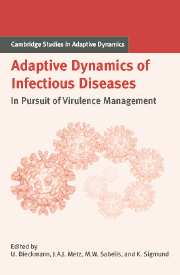Book contents
- Frontmatter
- Contents
- Contributing Authors
- List of Boxes
- Notational Standards
- 1 Introduction
- A Setting the Stage
- Introduction to Part A
- 2 Alternative Transmission Modes and the Evolution of Virulence
- 3 Wildlife Perspectives on the Evolution of Virulence
- 4 Adaptive Dynamics of Pathogen–Host Interactions
- 5 Dilemmas in Virulence Management
- B Host Population Structure
- C Within-Host Interactions
- D Pathogen–Host Coevolution
- E Multilevel Selection
- F Vaccines and Drugs
- G Perspectives for Virulence Management
- References
- Index
- International Institute for Applied Systems Analysis
3 - Wildlife Perspectives on the Evolution of Virulence
Published online by Cambridge University Press: 15 January 2010
- Frontmatter
- Contents
- Contributing Authors
- List of Boxes
- Notational Standards
- 1 Introduction
- A Setting the Stage
- Introduction to Part A
- 2 Alternative Transmission Modes and the Evolution of Virulence
- 3 Wildlife Perspectives on the Evolution of Virulence
- 4 Adaptive Dynamics of Pathogen–Host Interactions
- 5 Dilemmas in Virulence Management
- B Host Population Structure
- C Within-Host Interactions
- D Pathogen–Host Coevolution
- E Multilevel Selection
- F Vaccines and Drugs
- G Perspectives for Virulence Management
- References
- Index
- International Institute for Applied Systems Analysis
Summary
Introduction
The interaction between pathogens and their hosts is the most intimate of interspecific interactions. The pathogen is entirely dependent upon the host for resources and transmission to the next susceptible host in its life cycle. In contrast, the presence of pathogens usually leads to a reduction in host fitness through reductions in survival, fecundity, or opportunities to locate a mate. However, only a proportion of the host population is ever exposed to any particular parasite species, while all parasite populations are exposed to their hosts. These asymmetries in association and in the costs and benefits accrued to parasites and hosts are further compounded by asymmetries in the generation time of the two species: the generation time of the host often exceeds that of the parasite by several orders of magnitude. Consequently, when we examine the evolution of virulence and other components of parasite fitness, we usually focus on changes in parasite phenotype in response to constraints placed by the host's life history.
In this chapter, we analyze different aspects of the evolution of virulence in systems of free-living hosts and their parasites. First we establish the difference between micro- and macroparasite dynamics. Several documented population dynamic studies in which parasites have been shown to dramatically affect the abundance of host populations and the structure of biological communities are then discussed.
- Type
- Chapter
- Information
- Adaptive Dynamics of Infectious DiseasesIn Pursuit of Virulence Management, pp. 26 - 38Publisher: Cambridge University PressPrint publication year: 2002
- 1
- Cited by

